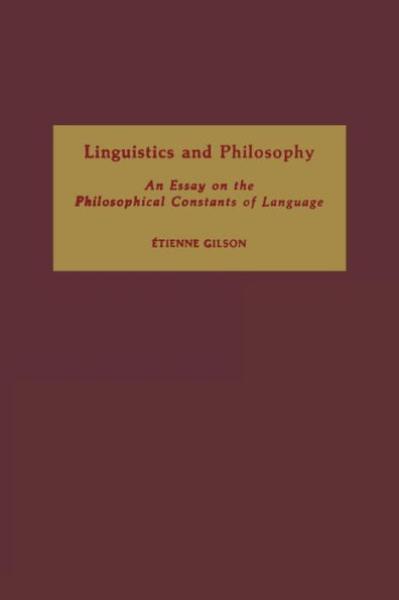Description
The dual purpose of this volume--to provide a distinctively philosophical introduction to logic, as well as a logic-oriented approach to philosophy--makes it a unique and worthwhile primary text for logic or philosophy courses.
Étienne Gilson (13 June 1884 - 19 September 1978) was a French philosopher and historian of philosophy. A scholar of medieval philosophy, he originally specialised in the thought of Descartes, yet also philosophized in the tradition of Thomas Aquinas, although he did not consider himself either a neo-Scholastic or neo-Thomist philosopher.
John Lyon is emeritus professor of liberal studies at the University of Notre Dame.
Gilson has attempted to speak from the tradition of Aristotle and Thomas Aquinas to contemporary philosophers, not only to linguists, to whom this book is principally addressed, but to all, such as analysts, who give great attention to language. He makes . . .an argument that is well worth hearing. Philosophers should take from this book not only the principal argument . . . but also the implied judgement of the place of the philosopher in science. Gilson treats linguistics as a science that stands in need of philosophical reasoning in order to perform its proper scientific function. Too often . . . the philosopher's job is thought to be one of commenting on the scientist's work after the scientist's work has been done in a vacuum completely free of any philosophical impurity. . . . The scientific project is not a project separate from philosophy, but is a thoroughly philosophical project from beginning to end, although this fact is not always adverted to by the scientists. . . . Gilson has given in this book . . . excellent evidence of how the philosopher should work with scientific evidence to further the pursuit of truth, which is at once scientific and philosophical. -- Canadian Philosophical Review-- "Canadian Philosophical Review"
Étienne Gilson (13 June 1884 - 19 September 1978) was a French philosopher and historian of philosophy. A scholar of medieval philosophy, he originally specialised in the thought of Descartes, yet also philosophized in the tradition of Thomas Aquinas, although he did not consider himself either a neo-Scholastic or neo-Thomist philosopher.
John Lyon is emeritus professor of liberal studies at the University of Notre Dame.
Gilson has attempted to speak from the tradition of Aristotle and Thomas Aquinas to contemporary philosophers, not only to linguists, to whom this book is principally addressed, but to all, such as analysts, who give great attention to language. He makes . . .an argument that is well worth hearing. Philosophers should take from this book not only the principal argument . . . but also the implied judgement of the place of the philosopher in science. Gilson treats linguistics as a science that stands in need of philosophical reasoning in order to perform its proper scientific function. Too often . . . the philosopher's job is thought to be one of commenting on the scientist's work after the scientist's work has been done in a vacuum completely free of any philosophical impurity. . . . The scientific project is not a project separate from philosophy, but is a thoroughly philosophical project from beginning to end, although this fact is not always adverted to by the scientists. . . . Gilson has given in this book . . . excellent evidence of how the philosopher should work with scientific evidence to further the pursuit of truth, which is at once scientific and philosophical. -- Canadian Philosophical Review-- "Canadian Philosophical Review"
Last updated on
Product Details
- University of Notre Dame Brand
- Jul 31, 2017 Pub Date:
- 0268160538 ISBN-10:
- 9780268160531 ISBN-13:
- 230 Pages
- 9 in * 6 in * 0.52 in Dimensions:
- 1 lb Weight:




